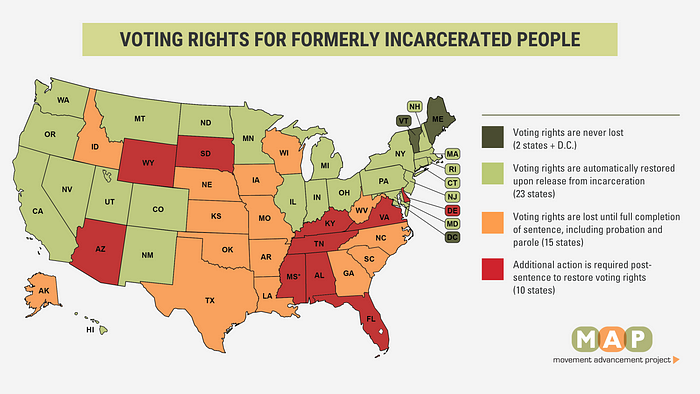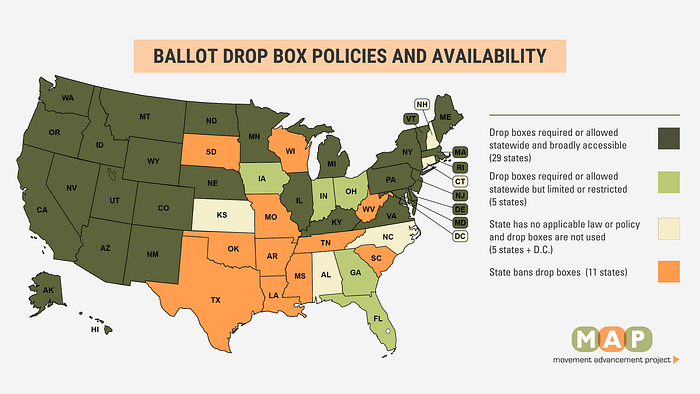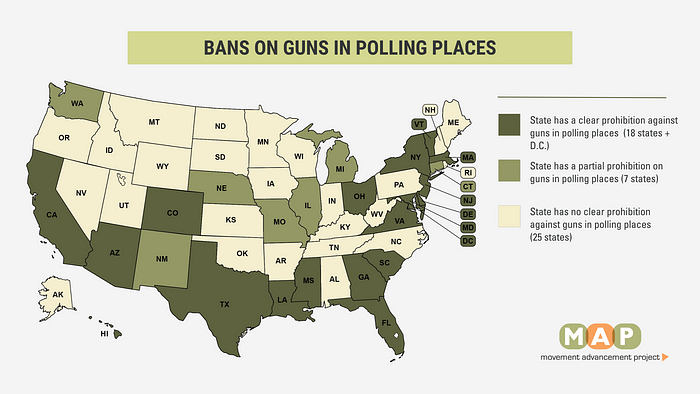Democracy Maps
Democracy Wrapped 2024: Tracing Shifts in the Voting and Election Landscape

While most of the attention this year was focused on the presidential election, states continued to make changes to their election and voting policies. Below we offer an overview of the major trends and biggest shifts from the past 12 months.
High Level Points of Interest
Presidential election years tend to be the least active in terms of election and voting legislation, in part due to the practice and principle of states not changing these policies too close to the election itself in order to avoid confusion for voters and election officials.
However, in the states that did enact new policies this year, the trend of diverging views of democracy has continued:
At least 14 states enacted new expansive laws or policies in 2024
Colorado, Connecticut, Hawaii, Indiana, Maryland, Massachusetts, Michigan, Minnesota, Nebraska, New Mexico, New York*, Virginia*, Washington, and Washington D.C.
At least 8 states enacted new restrictive laws or policies in 2024
Idaho, Kentucky, Louisiana*, Nevada, New Hampshire, North Carolina*, Tennessee, Wisconsin
* Note: these lists reflect issues tracked by MAP’s Democracy Maps, covering 50+ policies. States may have enacted additional expansive or restrictive policies not included here. States marked with an asterisk enacted multiple policies.
Voter Registration
In 2024, membership in the Electronic Registration Information Center (ERIC) continued to be a trend, in addition to restrictions on 3rd party registration drives.
Membership in ERIC
Since 2022, nine states have withdrawn from membership in ERIC. This year, Kentucky continued the alarming trend, passing a law which will result in the state’s withdrawal in 2025. Hawaii went the opposite direction, enacting a law which requires the state to apply for membership in ERIC next year. Currently, including Kentucky, only 24 states and D.C. remain members of ERIC, representing less than half of all eligible voters.
Restrictions on 3rd Party Registration Drives
Louisiana and Tennessee both enacted new laws this year restricting 3rd party voter registration drives, which are often non-partisan, community efforts that encourage and assist people in registering to vote. These laws impose burdensome requirements on the organizations conducting the drives, as well as restrictions such as short timelines to return completed forms, and prohibitions on pre-filling any information on forms. With these new laws, more than half of all states now restrict voter registration drives, representing 60% of all eligible voters.
Representation and Participation
Voting Rights for Formerly Incarcerated People
Nebraska was the only state to update their policy on voting rights restoration this year. The state’s new law expands access to voting rights for formerly incarcerated people by automatically restoring rights upon release from incarceration. Nebraska is now the 23rd state with automatic restoration, representing more than half of all eligible voters.

Voting In-Person
In 2024, states continued to focus on voter ID policies, which has been a consistent trend over the past decade.
Voter ID
New Hampshire became the latest state to adopt a strict photo ID law this year, with the new requirement going into effect following the November election. New Hampshire’s law is arguably the strictest in the country, removing all exceptions and requiring first time voters to provide documentary proof of citizenship.
Nevada and North Carolina also took steps towards implementing strict photo ID laws in the future; Nevada voters approved a ballot measure requiring strict photo ID that needs to pass again in 2026 to take effect, while the North Carolina legislature placed a similar measure on their state’s ballot in 2026. With New Hampshire’s new law, 1 in 5 eligible voters now live in a state with a strict photo ID law.
Curbside Voting
Virginia enacted a law which expands their existing policy on curbside voting to make more people eligible for this assistance. Curbside voting is a policy which allows voters who are unable to enter the polling place to cast their ballot in an accessible location, such as inside their vehicle.
Voting by Mail
Since the 2020 election, almost every state has adjusted their policies related to absentee and mail voting, and 2024 was no different.
Drop Boxes
In New York, the state enacted a law codifying the use of drop boxes, which were previously allowed to be used, yet had no uniform policy. In Wisconsin, the state supreme court reversed a previous decision that had banned the use of drop boxes. With these new policies, 29 states now require or allow the use of broadly accessible drop boxes statewide.

Third Party Ballot Collection
Idaho and Louisiana both enacted new restrictions on third party ballot collection this year. Idaho previously had no restrictions but now restricts ballot collection to relatives or caregivers. Louisiana put in place additional restrictions that restrict anyone other than immediate family members from possessing more than one voter’s ballot. Almost 70% of eligible voters now live in states that overly restrict ballot collection or ban it outright.
Election Security
Protections Against Election Related Disinformation
New York enacted a law this year continuing the relatively recent trend of policies explicitly protecting against election related disinformation, with 12 states now having this type of law in place. These policies prohibit the knowing dissemination of false information regarding the time, place and manner of conducting elections, as well as false or misleading information about the qualifications or restrictions related to voter eligibility.
Independence & Integrity
Protections for Election Officials
The biggest trend in election related legislation this year was states responding to the climate of violence and harassment by passing laws explicitly protecting election officials against these threats. Connecticut, Indiana, Maryland, Virginia, Washington, Wisconsin and Washington D.C. all enacted new protections for election officials, representing a rare bipartisan trend. 17 states and D.C. now have these protections in place.
Bans on Guns in Polling Places
States continue to regulate the possession of firearms in polling places, with Colorado, Massachusetts, Michigan and New Mexico enacting new bans this year. Michigan and New Mexico passed partial bans that prohibit the open carry of firearms in polls, while Massachusetts passed a total ban. Colorado expanded their previous ban to include concealed carry weapons. Over 70% of all eligible voters now live in states with at least a partial ban on guns in polling places.

Legislative Interference in Election Administration
Louisiana and North Carolina both enacted new restrictive laws this year that represent legislative interference in election administration.
Louisiana’s law prohibits election officials from implementing any directives or guidance relating to elections without the approval of the legislature and restricts election officials from accepting new federal funding for elections without approval of the legislature.
North Carolina’s law, passed in lame duck session over a veto before Democrats take control of key statewide offices next year, transfers power over the state election board and county boards from the governor to the state auditor’s office, which is controlled by Republicans.
These types of policies, all passed since 2020, undermine the will of voters and increase the danger of election interference.
State Voting Rights Acts
Minnesota continued the expansive trend of states implementing their own versions of the federal VRA, in response to the weakening of the federal law by the U.S. Supreme Court. Eight states now have these critical policies in place.
Bans on Private Funding for Election Administration
Wisconsin voters approved a ballot measure in April that bans private funding for election administration. The majority of states now have these policies in place, all enacted since 2020, which ignore the persisting gaps in funding for the critical function of running elections.
As expected in a presidential election year, 2024 was relatively quiet in terms of election and voting legislation. Conversely, as we move into 2025, MAP expects a very active legislative session and will continue to track the diverging developments in democracy policy across the states. Stay tuned for our legislative session forecast coming soon in January 2025.
